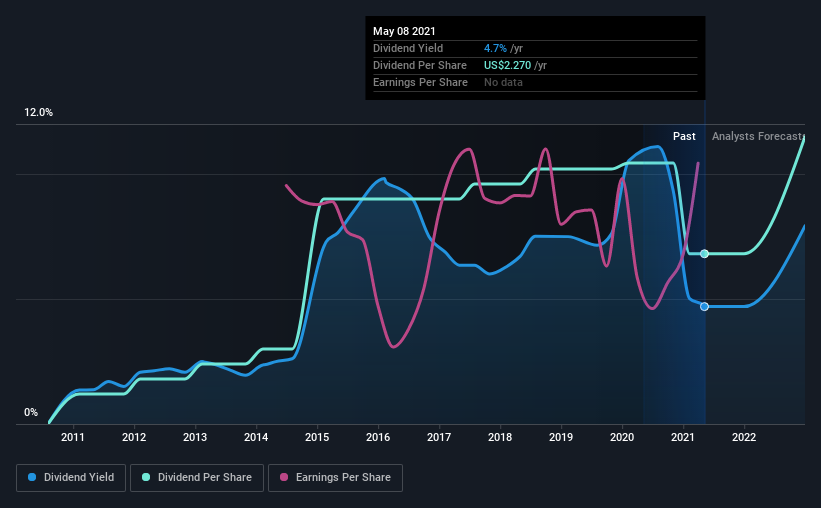CNA Financial (NYSE:CNA) Could Be A Buy For Its Upcoming Dividend
CNA Financial Corporation (NYSE:CNA) stock is about to trade ex-dividend in 4 days. This means that investors who purchase shares on or after the 14th of May will not receive the dividend, which will be paid on the 3rd of June.
CNA Financial's upcoming dividend is US$0.38 a share, following on from the last 12 months, when the company distributed a total of US$2.27 per share to shareholders. Last year's total dividend payments show that CNA Financial has a trailing yield of 4.7% on the current share price of $48.34. If you buy this business for its dividend, you should have an idea of whether CNA Financial's dividend is reliable and sustainable. That's why we should always check whether the dividend payments appear sustainable, and if the company is growing.
View our latest analysis for CNA Financial
Dividends are typically paid out of company income, so if a company pays out more than it earned, its dividend is usually at a higher risk of being cut. That's why it's good to see CNA Financial paying out a modest 38% of its earnings.
When a company paid out less in dividends than it earned in profit, this generally suggests its dividend is affordable. The lower the % of its profit that it pays out, the greater the margin of safety for the dividend if the business enters a downturn.
Click here to see the company's payout ratio, plus analyst estimates of its future dividends.
Have Earnings And Dividends Been Growing?
Companies with consistently growing earnings per share generally make the best dividend stocks, as they usually find it easier to grow dividends per share. Investors love dividends, so if earnings fall and the dividend is reduced, expect a stock to be sold off heavily at the same time. Fortunately for readers, CNA Financial's earnings per share have been growing at 17% a year for the past five years.
Many investors will assess a company's dividend performance by evaluating how much the dividend payments have changed over time. In the last 10 years, CNA Financial has lifted its dividend by approximately 19% a year on average. Both per-share earnings and dividends have both been growing rapidly in recent times, which is great to see.
The Bottom Line
From a dividend perspective, should investors buy or avoid CNA Financial? Typically, companies that are growing rapidly and paying out a low fraction of earnings are keeping the profits for reinvestment in the business. This strategy can add significant value to shareholders over the long term - as long as it's done without issuing too many new shares. Overall, CNA Financial looks like a promising dividend stock in this analysis, and we think it would be worth investigating further.
In light of that, while CNA Financial has an appealing dividend, it's worth knowing the risks involved with this stock. To help with this, we've discovered 2 warning signs for CNA Financial that you should be aware of before investing in their shares.
If you're in the market for dividend stocks, we recommend checking our list of top dividend stocks with a greater than 2% yield and an upcoming dividend.
This article by Simply Wall St is general in nature. It does not constitute a recommendation to buy or sell any stock, and does not take account of your objectives, or your financial situation. We aim to bring you long-term focused analysis driven by fundamental data. Note that our analysis may not factor in the latest price-sensitive company announcements or qualitative material. Simply Wall St has no position in any stocks mentioned.
Have feedback on this article? Concerned about the content? Get in touch with us directly. Alternatively, email editorial-team (at) simplywallst.com.

 Yahoo Finance
Yahoo Finance 
